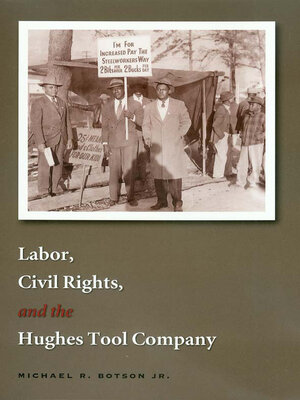Labor, Civil Rights, and the Hughes Tool Company
ebook ∣ Kenneth E. Montague Series in Oil and Business History
By Michael R. Botson

Sign up to save your library
With an OverDrive account, you can save your favorite libraries for at-a-glance information about availability. Find out more about OverDrive accounts.
Find this title in Libby, the library reading app by OverDrive.



Search for a digital library with this title
Title found at these libraries:
| Library Name | Distance |
|---|---|
| Loading... |
On July 12, 1964, in a momentous decision, the National Labor Relations Board decertified the racially segregated Independent Metal Workers Union as the collective bargaining agent at Houston's mammoth Hughes Tool Company. The unanimous decision ending nearly fifty years of Jim Crow unionism at the company marked the first time in the Labor Board's history that it ruled that racial discrimination by a union violated the National Labor Relations Act and was therefore illegal. The ruling was for black workers the equivalent of the Brown v. Board of Education decision by the Supreme Court in the area of education.
Michael R. Botson carefully traces the Jim Crow unionism of the company and the efforts of black union activists to bring civil rights issues into the workplace. His analysis places Hughes Tool in the context created by the National Labor Relations Act and the formation of the Congress of Industrial Organizations (CIO). It clearly demonstrates that without federal intervention, workers at Hughes Tool would never have been able to overcome management's opposition to unionization and to racial equality.
Drawing on interviews with many of the principals, as well as extensive mining of company and legal archives, Botson's study "captures a moment in time when a segment of Houston's working-class seized the initiative and won economic and racial justice in their work place."
Michael R. Botson carefully traces the Jim Crow unionism of the company and the efforts of black union activists to bring civil rights issues into the workplace. His analysis places Hughes Tool in the context created by the National Labor Relations Act and the formation of the Congress of Industrial Organizations (CIO). It clearly demonstrates that without federal intervention, workers at Hughes Tool would never have been able to overcome management's opposition to unionization and to racial equality.
Drawing on interviews with many of the principals, as well as extensive mining of company and legal archives, Botson's study "captures a moment in time when a segment of Houston's working-class seized the initiative and won economic and racial justice in their work place."







